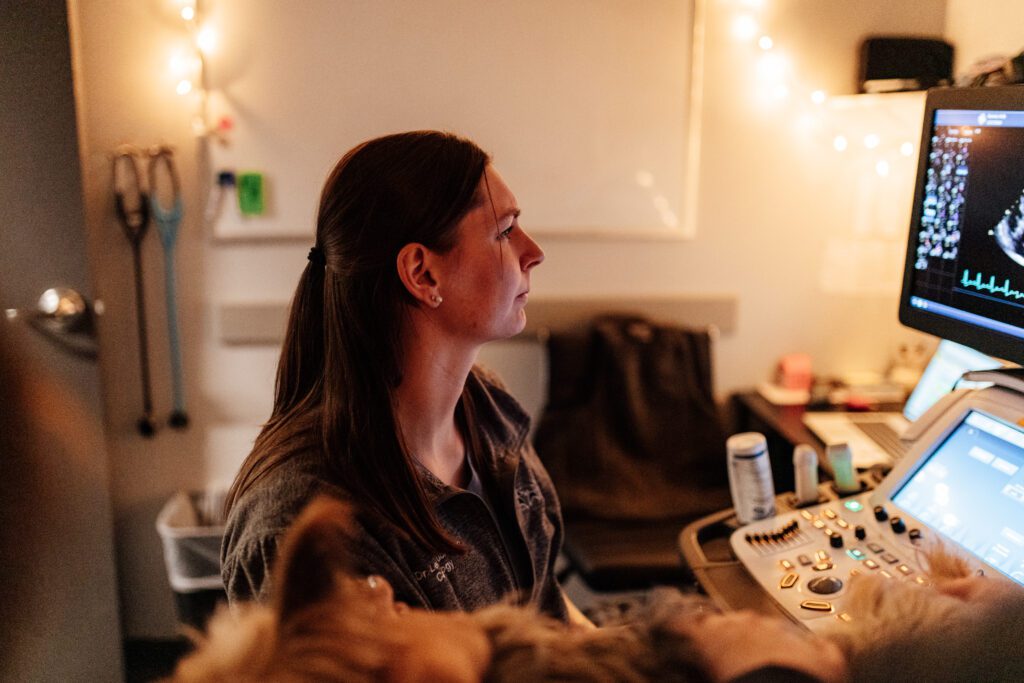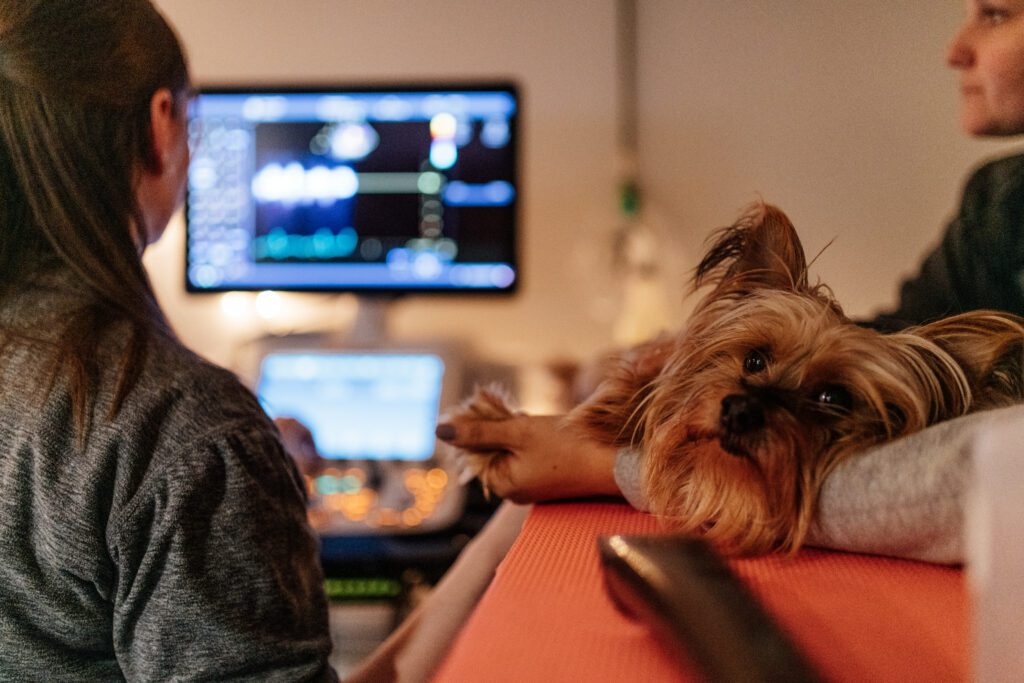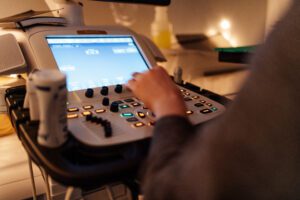What to Expect
 Board-certified veterinary cardiologists specialize in the diagnosis, treatment, and prevention of heart, lung, and vascular diseases. Their focus is the diagnosis and treatment of congestive heart failure, damage to the heart muscle or valves, cardiac arrhythmias, congenital defects, diseases of the pericardium, high blood pressure, coughing, and other breathing issues. Including a cardiologist in the care of a pet with heart disease can improve their long-term prognosis and quality of life.
Board-certified veterinary cardiologists specialize in the diagnosis, treatment, and prevention of heart, lung, and vascular diseases. Their focus is the diagnosis and treatment of congestive heart failure, damage to the heart muscle or valves, cardiac arrhythmias, congenital defects, diseases of the pericardium, high blood pressure, coughing, and other breathing issues. Including a cardiologist in the care of a pet with heart disease can improve their long-term prognosis and quality of life.
Our cardiologists work in conjunction with the radiology, surgery, internal medicine, critical care, and oncology departments, since patients with cardiac conditions may also have additional underlying or complicating medical problems. Treatment options for the various conditions managed by our doctors may range from monitoring to preventative medications to medications to alleviate symptoms or interventional procedures.
Initial consultation
 Your cardiology visit will start with a veterinary technician collecting your pet’s pertinent history. The technician will take your pet to the cardiology suite where the doctor will start with a focused cardiovascular physical examination. This exam, along with your pet’s clinical history, will guide which diagnostic tests are indicated to properly diagnose and treat your pet. Typically, diagnostics will include an echocardiogram to evaluate the structure and function of the heart and a blood pressure reading. Additional tests such as an electrocardiogram (ECG/EKG), which evaluates the electrical system in the heart, chest x-rays to evaluate the lungs, which can be compromised with advanced heart disease, and blood work to monitor patients on certain types of medications may also be recommended. These diagnostic tests can help guide the careful management of patients with advanced heart disease. The doctor will review all test results and provide a summary before the end of the appointment.
Your cardiology visit will start with a veterinary technician collecting your pet’s pertinent history. The technician will take your pet to the cardiology suite where the doctor will start with a focused cardiovascular physical examination. This exam, along with your pet’s clinical history, will guide which diagnostic tests are indicated to properly diagnose and treat your pet. Typically, diagnostics will include an echocardiogram to evaluate the structure and function of the heart and a blood pressure reading. Additional tests such as an electrocardiogram (ECG/EKG), which evaluates the electrical system in the heart, chest x-rays to evaluate the lungs, which can be compromised with advanced heart disease, and blood work to monitor patients on certain types of medications may also be recommended. These diagnostic tests can help guide the careful management of patients with advanced heart disease. The doctor will review all test results and provide a summary before the end of the appointment.
Our cardiologists are experienced in performing image-guided, minimally invasive cardiac catheterization procedures such as pacemaker implantations, balloon valvuloplasties, and PDA occlusions with Amplatz Canine Duct Occluder (ACDO) devices.
We understand that each pet is unique and will work with you to find the best treatment option for your pet and family situation. During the appointment, you will have an opportunity to ask questions about the benefits and risks of any medications, procedures, required follow-ups, and expected outcomes.
Common diagnostics that may be used in diagnosing your pet:
- Echocardiography – Sonogram/ultrasound study of the heart
- Electrocardiography (ECG/EKG) – Records the electrical conduction and rhythm of the heart

- Blood pressure measurement
- Thoracic radiographs – A series of digital pictures taken to evaluate and identify any possible abnormalities
in the chest - Holter monitor – An ambulatory ECG monitor that your pet wears home to record heart rate and rhythm
for 24 hours - In-Hospital Telemetry – Continuous ECG monitoring of heart rate and rhythm while in the hospital
- Laboratory procedure – Includes complete blood counts and biochemistry profiles among others
- Image-guided procedure – May be recommended in some cases. For example, implantation of a pacemaker, balloon valvuloplasty, PDA occlusion, or angiography
Appointments
The time required for a cardiology appointment is dependent upon the amount of diagnostic workup warranted and is, therefore, variable with each individual case. Typically, between 1-2 hours is necessary for most cases.
Follow-up care
While your primary care veterinarian can handle many aspects of your pet’s care, there are certain conditions and complex cases that require the ongoing management of a specialist. The cardiology team will discuss with you whether it is appropriate to follow-up directly with VSC or your primary care veterinarian. All routine preventive care should continue with your primary care veterinarian.
Questions or concerns
For any non-urgent questions, you will be asked to leave a message for the cardiology team or you can email them directly at cardiology@vetspecialty.com. If you have any urgent medical concerns
outside the Cardiology Department’s normal business hours, please call our Emergency and Critical Care Department 24 hours a day (847.459.7535).
Patient care plan
The doctor reviews all medical records prior to the appointment and develops a tentative patient care plan that will be reviewed with you by one of the technicians. They can discuss the various options that are available. If you need to speak directly to the doctor prior to tests being performed, please let us know. Once you consent to a course of treatment, you will be presented with a patient care plan that includes an approximate range for the cost of care and gives your authorization for treatment. You are required to leave 100% of the low end of the patient care plan when your pet is admitted to the hospital or at the time of service.
Payment options
Accepted payment options include cash, check, and credit card (Visa, MasterCard, Discover, and American Express). Financing options are available through CareCredit for qualifying individuals. If you are interested in applying for CareCredit, please let a member of our team know or apply online at www.carecredit.com.
Prescription refills
To allow our staff to provide the in-depth care necessary for our hospitalized patients, we require 48 hours’ notice for prescription refills. There is a $25 fee for refills requested outside of the regular Cardiology Department hours Monday through Friday from 9 am – 5 pm. Per FDA regulations, dispensed medications may not be returned to VSC (CPG sec. 460.300).
